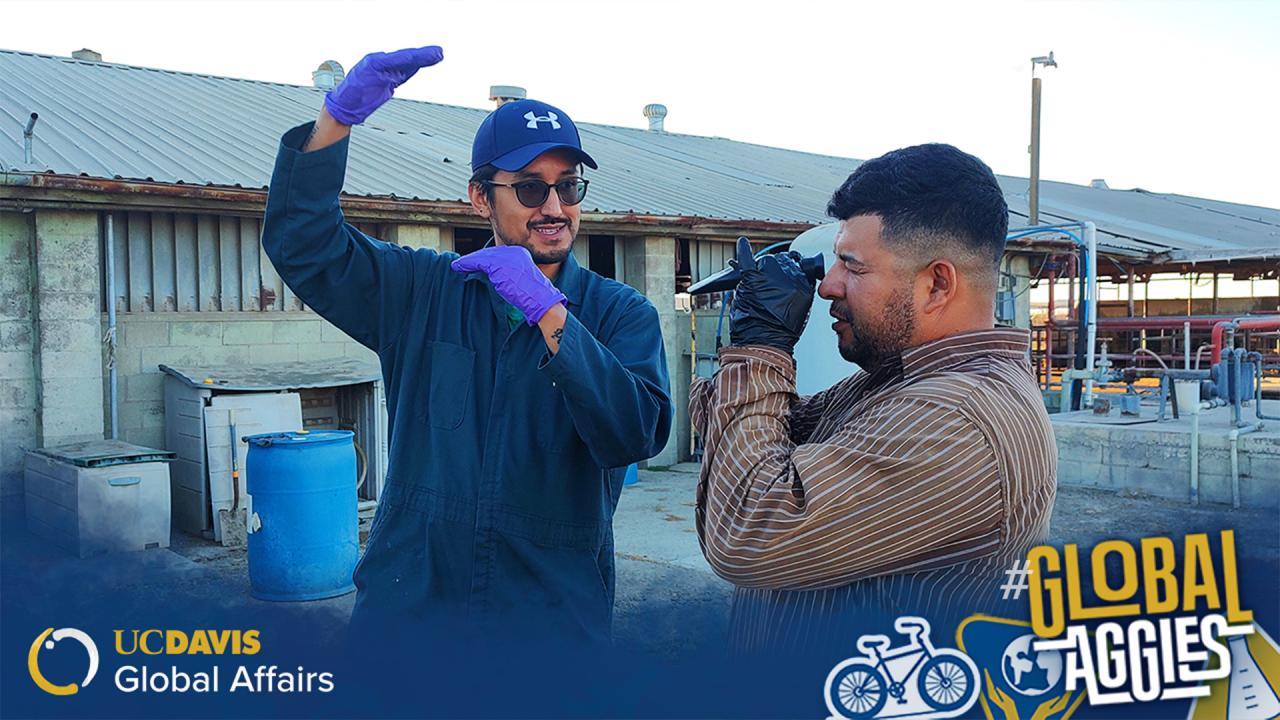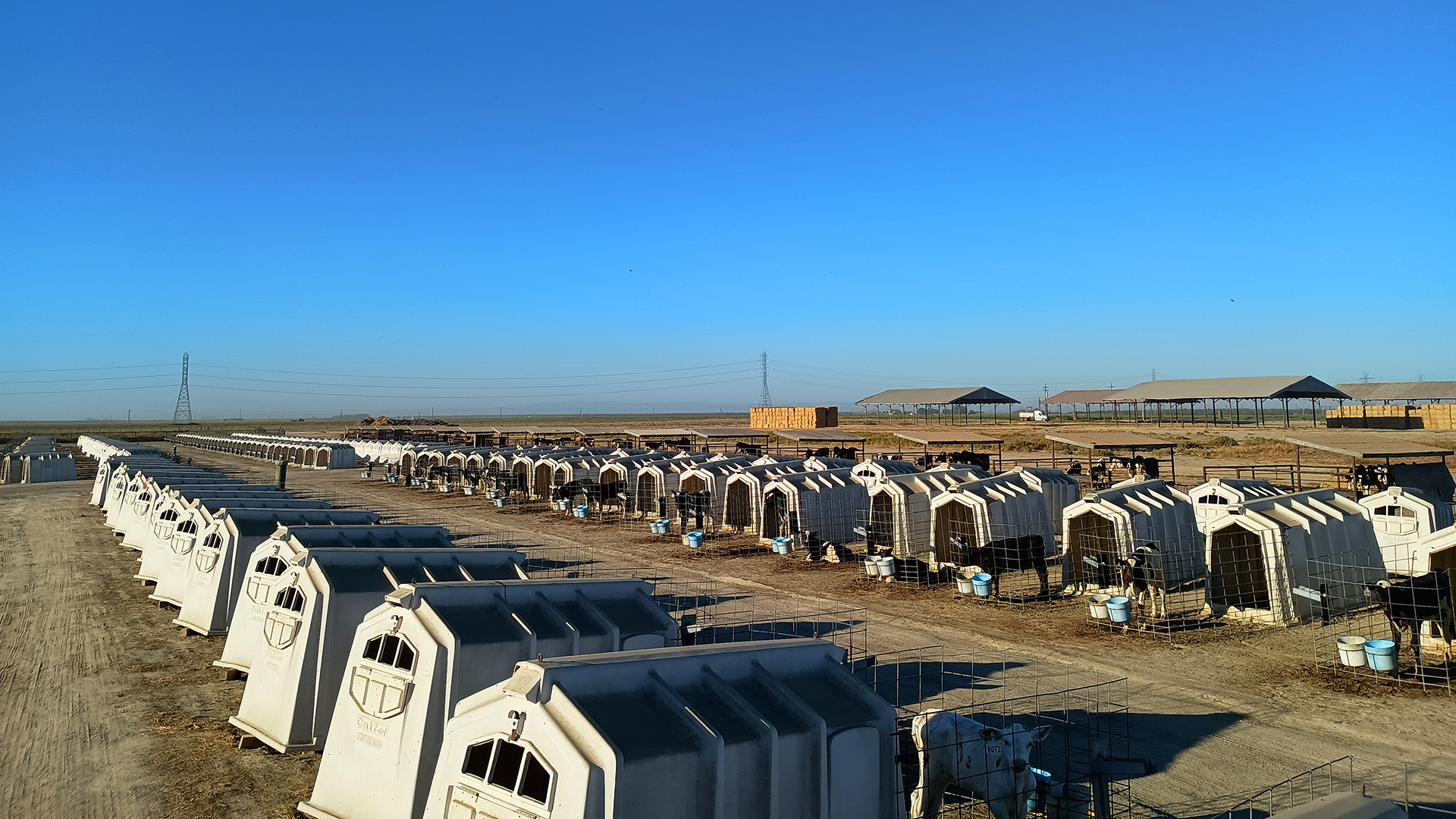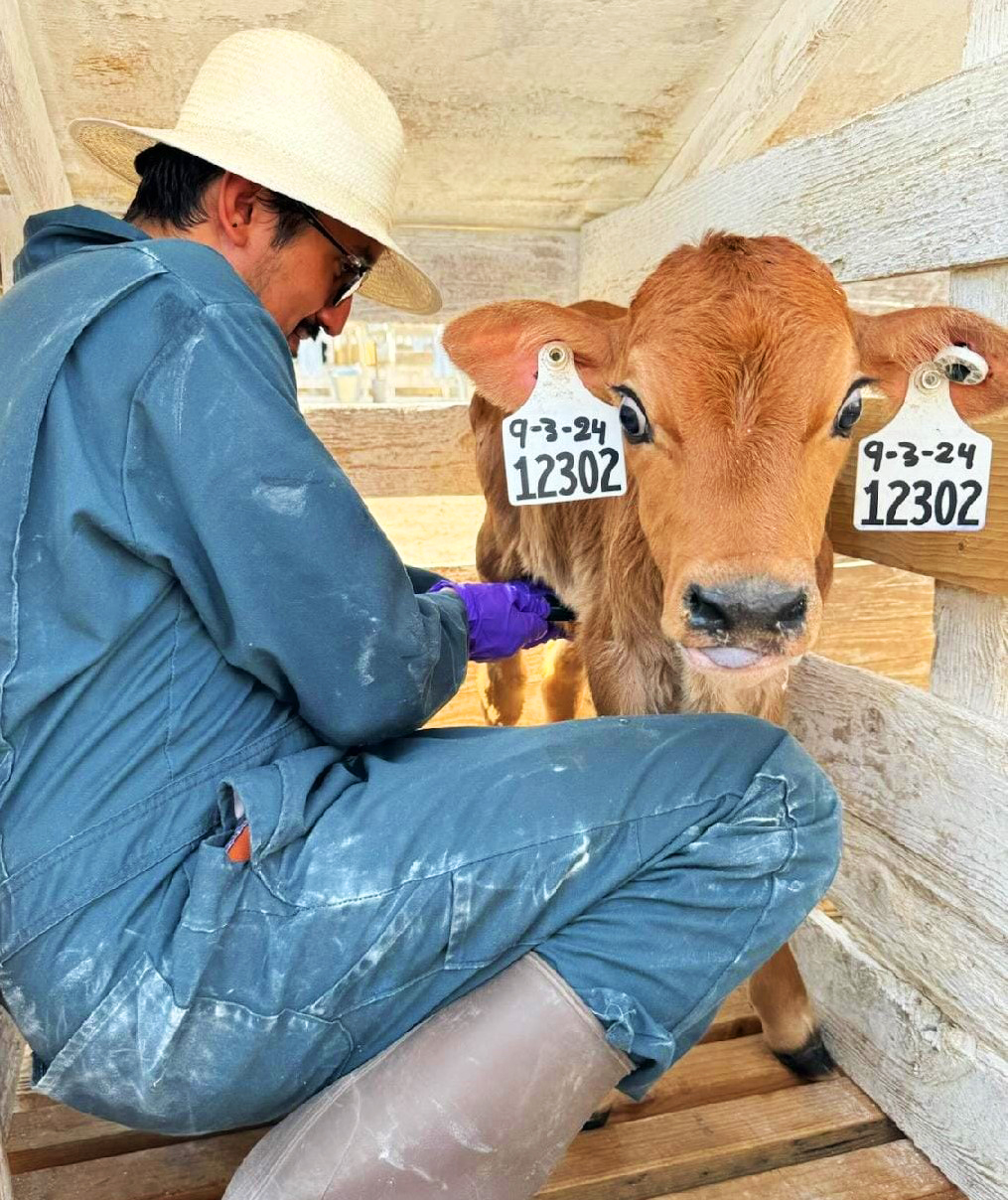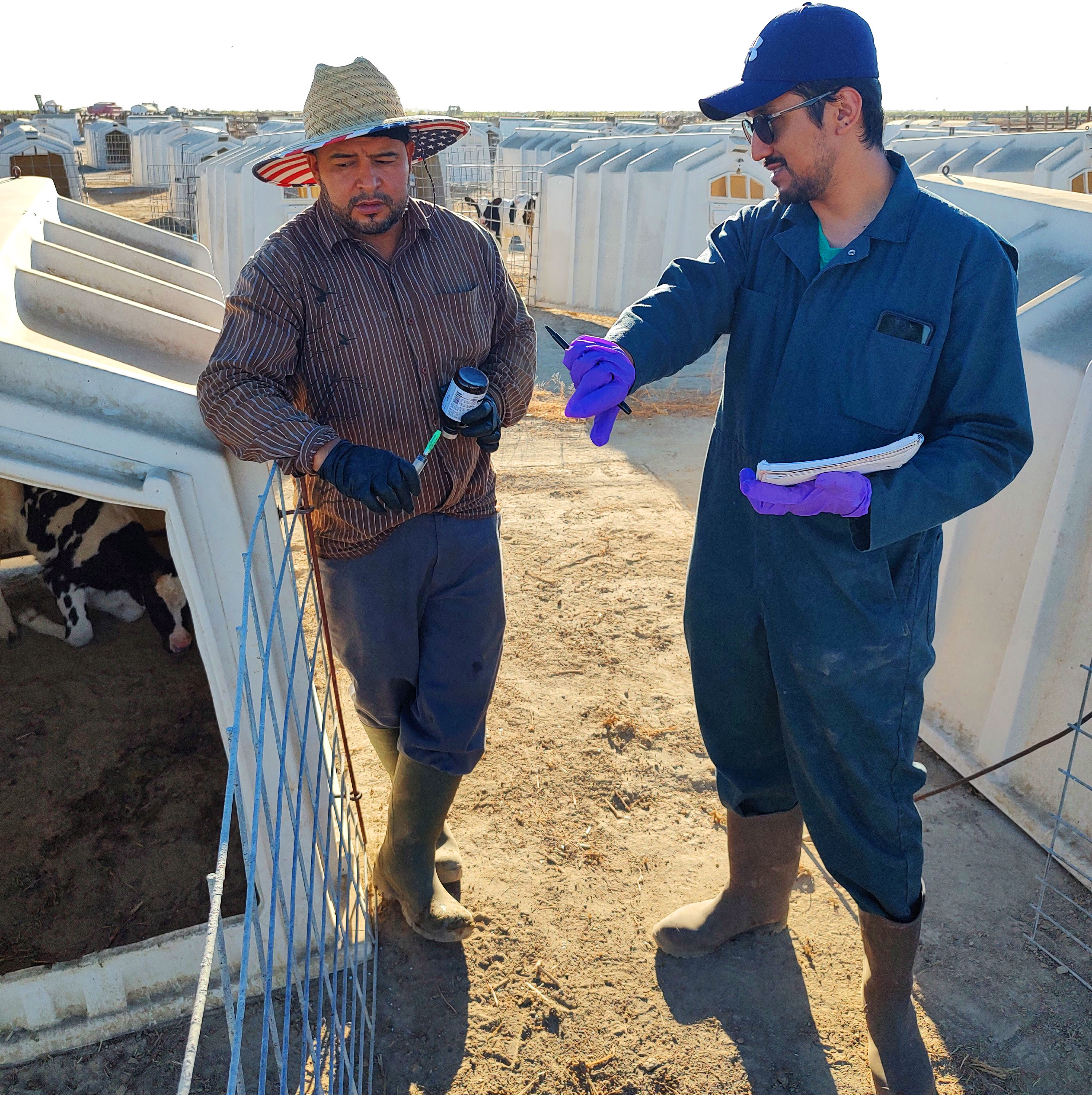
Language, Culture and Science: Documenting Dairy Farming in California
Name
Christian Bernal-Córdoba
Field of Study
Ph.D. in Animal Biology
Class Standing
Graduate Student
Graduation Year
June 2026
Virtual or In-Person
In-Person
Program Title, Location, Duration
Global Grad Grant - Research Track: Documenting Animal Management Practices and Challenges Faced by Hispanic Workers on California Dairy Farms
What motivated or led you to participate in your global learning program?
I applied for the Global Grad Grant - Research Track program to combine my research with the invaluable expertise of Hispanic farm workers on California dairy farms. These individuals hold a wealth of practical knowledge gained through years of hands-on animal care and management. This program offered a unique opportunity to engage with these workers, learn from their lived experiences and integrate these insights into my research. By combining scientific methods with real-world practices, I aimed to develop more effective, context-aware strategies for antimicrobial use and animal management that benefit both animal welfare and farm worker well-being.
What was your experience like in this program? What did you learn from your experience: interacting with other people and cultures; academics; addressing global challenges; and/or developing global skills and leadership?
The summer of 2024 was deeply rewarding, both personally and professionally. As a Colombian fluent in Spanish and English, I worked closely with Hispanic farm workers from Mexico, Nicaragua and Honduras. Building trust required more than just language fluency; it demanded cultural empathy and mutual respect. I also collaborated with American veterinarians and farm owners, which required adapting my communication style to a different professional context. Navigating across languages and cultures sharpened my interpersonal skills and deepened my ability to bridge diverse perspectives. Collaborating with Brazilian dairy advisors added another layer of global learning and even introduced me to some Portuguese. Overall, the experience strengthened my understanding of how communication and cultural awareness are essential for effective extension work and science translation from academia to real-world settings.
What was the most challenging part of your program and the most rewarding?
Recruiting farms to participate in the survey was one of the most challenging parts of the project. Many owners were initially hesitant, concerned that the study might be an audit of their management practices. To build trust, I contacted them directly, starting each conversation with small talk and following up with brief, transparent explanations of the project’s goals. This approach helped ease their concerns and encouraged participation. Another challenge arose during interviews with farm workers. Due to their demanding schedules, many had limited time to talk, so I often conducted interviews while they worked. At first, using paper surveys made some workers uneasy, which affected the openness of their responses. After switching to recorded interviews, with their consent, workers became more relaxed, and the quality of the information improved significantly.

What’s one of your most memorable experiences from your program?
One of the most unforgettable moments of the summer was visiting a massive calf-raising facility that housed 90,000 calves, a stark contrast to the smaller farms I had previously worked with. Gaining access to a facility of that scale is rare, so I was excited to document management practices alongside my mentor and a fellow PhD student. Despite the extreme summer heat, which reached over 40 degrees Celsius (105 degrees Fahrenheit), the workers greeted us warmly and even offered us drinks, an act of kindness that left a lasting impression. However, the experience took an unexpected turn. The day after our visit, the facility's veterinarian asked workers to assess 15,000 calves using a method we had discussed during our visit. As a result, more than 75 percent of the calves were treated with antibiotics. For someone focused on reducing antimicrobial use in livestock, this outcome was deeply concerning. It made me realize how easily well-intentioned insights can be misunderstood or misapplied. This experience was a valuable reminder of the responsibility that comes with sharing knowledge, and the importance of clear, thoughtful communication in fieldwork.

What was a typical day like on your program?
My routine alternated between intense fieldwork and quieter office days. On busy days, I’d wake at 3 a.m., pick up a lab mate and head to a farm to observe early morning practices like milk preparation and calf feeding. After data collection, we returned to the lab in Tulare (UC Davis Veterinary Medicine Teaching & Research Center) to process samples, often skipping lunch to keep up with the workload. Lab work would continue until evening. Office days involved organizing data, coordinating follow-ups with farms and preparing materials for analysis. This rhythm, though demanding, offered a balanced blend of field experience and analytical work.
What advice do you have for someone considering your program or a global experience, in general? What would you like to share with students who might have similar identities or experiences as you?
My advice: step outside your comfort zone. It’s easy to remain in the supportive environment of campus life, but real growth often happens when you engage with unfamiliar settings and new people. Fieldwork connects you with individuals whose perspectives differ from those in academia, and that’s where meaningful learning begins. These connections offer fresh insights into complex challenges. While the first steps can be the hardest, the most valuable rewards often lie just beyond those initial obstacles—a reminder that lasting progress is built through perseverance and resilience.

What was your biggest concern in regards to participating in the program? Were you able to overcome that concern, and if so, how? What advice would you give someone who has similar concerns?
My biggest concern was relocating from Davis to a small Central Valley town (Tulare). Leaving behind familiar routines and starting anew at a different research facility felt overwhelming. But once I settled in, I quickly adapted. The Global Leadership Certificate Program also helped ease the transition, offering guidance and frameworks that made the experience more manageable and rewarding.
What is something you wish you knew before joining the program? If knowing this previously, how do you think this would have impacted your experience?
I wish I had known earlier that farm recruitment would fall mostly on me. Had I anticipated this, I would have started outreach before moving to Tulare. Delayed recruitment set back data collection, as initial contacts only began after my arrival. With earlier planning, I could have launched fieldwork immediately, saving time and making the most of my stay.
How do you think your program experiences will benefit you in the future—thinking academically, future career goals, or personally?
This experience has been instrumental in strengthening the communication skills essential for my future career as a researcher, extension specialist and science communicator. As I continue conducting research on dairy farms, I will need to engage stakeholders, present findings and co-develop solutions. This work aligns with the outreach mission of my lab, which focuses on science-based, practical recommendations to improve management practices, sustainability and operational efficiency. A deeper understanding of real-world constraints will allow me to carry out more relevant and impactful research, whether in California, Colombia or beyond.
Please elaborate on any aspect of your identity or experience that impacted your program decisions or time on the program.
As an international and first-generation graduate student from Colombia, my background shaped every aspect of this experience. During conversations with Hispanic farm workers, many of whom were also immigrants, I was often asked about university life. Some expressed hopes that their children would pursue higher education and even asked to share my contact information with them. I hadn’t anticipated becoming a role model across borders and cultures, but these moments were deeply meaningful. They reminded me of the importance of representation and the power of shared experiences.
Is there anything else you would like to share?
I want to express my heartfelt gratitude to Kimberly Bellows and the entire team at the UC Davis Global Learning Hub for their support throughout the grant period. Their dedication made this summer an incredible experience for me and the other fellows, and I am deeply thankful for the opportunities provided.